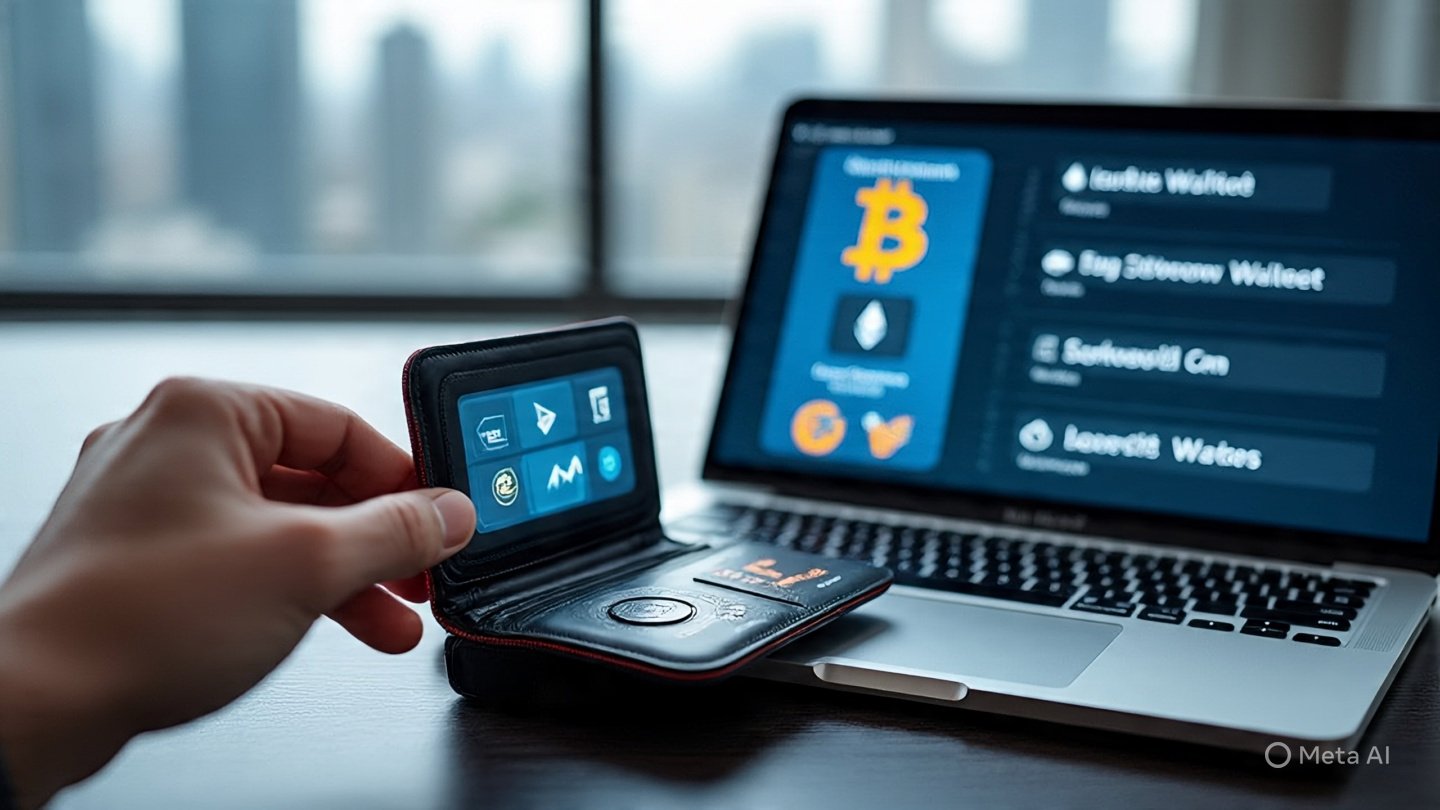Choosing the best cryptocurrency wallets for beginners 2025 can feel overwhelming when you’re just starting your crypto journey. With digital assets becoming mainstream and Bitcoin reaching new heights, securing your cryptocurrency investments has never been more critical. Whether you’re planning to buy your first Bitcoin, Ethereum, or exploring altcoins, selecting the right wallet is your first line of defense against hackers and scams.
The cryptocurrency market has evolved dramatically, and so have wallet technologies. Today’s best cryptocurrency wallets for beginners 2025 offer user-friendly interfaces, enhanced security features, and seamless integration with popular exchanges. However, with hundreds of options available, new investors often struggle to distinguish between hardware wallets, software wallets, and web-based solutions. This comprehensive guide will help you navigate the complex world of crypto storage, ensuring your digital assets remain safe while providing easy access for trading and transactions.
What Are Cryptocurrency Wallets and Why Do You Need One?
A cryptocurrency wallet is a digital tool that stores your private keys and enables you to send, receive, and manage your digital assets. Unlike traditional wallets that hold physical cash, crypto wallets don’t actually store cryptocurrencies. Instead, they store the cryptographic keys that prove ownership of your digital assets on the blockchain.
Understanding wallet basics is crucial for crypto security. When you “send” cryptocurrency, you’re actually using your private key to digitally sign a transaction that transfers ownership on the blockchain. Your wallet generates and manages these keys, making it the gateway to your crypto investments.
Public Keys vs. Private Keys: The Foundation of Crypto Security
Your cryptocurrency wallet generates two types of keys: public keys and private keys. Think of your public key as your bank account number – it’s safe to share and allows others to send you cryptocurrency. Your private key, however, is like your PIN number – it must remain secret and grants full access to your funds.
The golden rule of cryptocurrency is: “Not your keys, not your crypto.” This means if you don’t control your private keys (such as when using exchange wallets), you don’t truly own your cryptocurrency. This principle makes choosing the right wallet type essential for long-term security.
Types of Cryptocurrency Wallets: Finding Your Perfect Match

ximum Security for Long-Term Storage
Hardware wallets are physical devices that store your private keys offline, making them immune to online hacking attempts. These devices are widely considered the gold standard for cryptocurrency security and are perfect for investors planning to hold crypto long-term.
Advantages of Hardware Wallets:
- Offline storage provides maximum security
- Protection against malware and viruses
- Backup and recovery options
- Support for multiple cryptocurrencies
- Physical confirmation required for transactions
Disadvantages:
- Higher upfront cost ($50-200)
- Less convenient for frequent trading
- Can be lost or damaged
- Learning curve for beginners
Software Wallets: Balancing Security and Convenience
Software wallets are applications you install on your computer or smartphone. They offer a good balance between security and usability, making them popular among beginners who want easy access to their crypto while maintaining control of their private keys.
Mobile Wallets provide convenience for everyday transactions and are perfect for small amounts you might use for payments or quick trades. Popular options include Trust Wallet, Exodus, and Coinbase Wallet.
Desktop Wallets offer enhanced security compared to mobile versions and often provide more advanced features. They’re ideal for users who primarily manage crypto from their computers.
Web Wallets: Easy Access with Trade-offs
Web wallets operate through internet browsers and are often provided by cryptocurrency exchanges. While they offer maximum convenience and are perfect for beginners, they require trusting a third party with your private keys.
Exchange Wallets like those provided by Coinbase, Binance, or Kraken are technically web wallets. They’re excellent for beginners due to their user-friendly interfaces and integrated trading features, but they don’t give you full control over your private keys.
Best Cryptocurrency Wallets for Beginners 2025: Top Recommendations
1. Ledger Nano S Plus: Best Overall Hardware Wallet
The Ledger Nano S Plus stands out as the best cryptocurrency wallet for beginners 2025 in the hardware category. Priced around $79, it offers enterprise-level security in a user-friendly package that supports over 5,500 cryptocurrencies.
Key Features:
- Secure Element chip for maximum protection
- Ledger Live app for easy management
- Supports 100+ apps simultaneously
- USB-C connectivity
- Bluetooth-free design for enhanced security
Why It’s Perfect for Beginners: The Nano S Plus combines robust security with an intuitive setup process. The Ledger Live companion app guides new users through every step, from initial setup to making their first transaction. The device’s screen clearly displays transaction details, helping beginners verify what they’re signing.
2. Exodus Wallet: Best Software Wallet for Ease of Use
Exodus has earned its reputation as a beginner-friendly software wallet with a beautiful interface and comprehensive educational resources. Available for desktop and mobile, it supports over 260 cryptocurrencies and includes a built-in exchange feature.
Standout Features:
- Intuitive, design-focused interface
- Built-in ShapeShift integration for swapping
- 24/7 customer support
- Portfolio tracking and charts
- Desktop and mobile synchronization
Beginner Benefits: Exodus eliminates technical complexity with its visual approach to crypto management. The wallet displays your portfolio in easy-to-understand charts and graphs, making it simple to track your investments’ performance. The built-in exchange feature means beginners can trade cryptocurrencies without leaving the wallet.
3. Coinbase Wallet: Best for Integration with Major Exchange
While separate from the Coinbase exchange, Coinbase Wallet gives you full control of your private keys while maintaining the user-friendly experience the platform is known for. It’s available as a mobile app and browser extension.
Notable Features:
- Self-custody with private key control
- DeFi and NFT support
- WalletConnect integration
- Coinbase Pay integration
- Multi-chain support including Ethereum, Polygon, and Avalanche
4. Trust Wallet: Best Mobile Wallet for Multiple Blockchains
Trust Wallet, acquired by Binance in 2018, has become one of the most popular mobile wallets for beginners. It supports over 60 blockchains and includes a built-in Web3 browser for accessing decentralized applications.
Key Advantages:
- Support for 4.5+ million crypto assets
- Built-in DApp browser
- Staking capabilities for multiple coins
- WalletConnect compatibility
- Regular security audits
5. MetaMask: Best for Ethereum and DeFi Beginners
MetaMask has become synonymous with Ethereum and DeFi interactions. While primarily designed for the Ethereum ecosystem, it now supports multiple blockchains and serves as a gateway to the decentralized web.
Core Features:
- Browser extension and mobile app
- Seamless DeFi integration
- Hardware wallet compatibility
- Custom network support
- Token swapping capabilities
Essential Security Features to Look for in Crypto Wallets
Two-Factor Authentication (2FA)
Always choose wallets that support two-factor authentication. This adds an extra layer of security by requiring a second form of verification beyond your password. Most quality wallets support authenticator apps like Google Authenticator or Authy.
Backup and Recovery Options
Your chosen wallet should provide clear backup and recovery procedures. Look for wallets that use BIP39 standard recovery phrases (12, 18, or 24 words) that can restore your funds even if the original wallet is lost or damaged.
Open Source Code
Open-source wallets allow independent security audits and community verification of the code. This transparency helps ensure there are no hidden vulnerabilities or backdoors that could compromise your funds.
Multi-Signature Support
Multi-signature (multisig) wallets require multiple private keys to authorize transactions. While more complex, they provide additional security for larger amounts by distributing control across multiple devices or people.
Step-by-Step Guide: Setting Up Your First Crypto Wallet
Choosing Between Hot and Cold Storage
Before setting up your wallet, decide how you’ll use your cryptocurrency. For daily transactions and trading, a “hot” wallet (connected to the internet) offers convenience. For long-term storage, a “cold” wallet (offline storage) provides maximum security.
Setting Up a Hardware Wallet (Using Ledger as Example)
- Purchase from Official Sources: Only buy hardware wallets directly from the manufacturer or authorized retailers to avoid tampering.
- Initial Setup: Connect your device and follow the on-screen instructions to generate your seed phrase.
- Secure Your Seed Phrase: Write down your 24-word recovery phrase on the provided recovery sheet. Never store this digitally or take photos.
- Install Ledger Live: Download and install the official Ledger Live application from the manufacturer’s website.
- Add Cryptocurrency Apps: Install apps for the cryptocurrencies you plan to store (Bitcoin, Ethereum, etc.).
- Test with Small Amounts: Before transferring large sums, test your wallet with small transactions to ensure everything works correctly.
Setting Up a Software Wallet (Using Exodus as Example)
- Download Official App: Visit the official Exodus website and download the appropriate version for your device.
- Create New Wallet: Open the application and choose “Create New Wallet” rather than restoring from backup.
- Secure Your Backup Phrase: Exodus will generate a 12-word backup phrase. Write this down and store it securely offline.
- Set Up Security Features: Enable all available security features, including password protection and biometric authentication if available.
- Start with Supported Currencies: Begin with major cryptocurrencies like Bitcoin and Ethereum before exploring alternative coins.
Common Beginner Mistakes and How to Avoid Them
Keeping All Crypto on Exchanges
Many beginners leave their cryptocurrency on exchange wallets for convenience. While modern exchanges implement strong security measures, they remain high-value targets for hackers. The 2022 FTX collapse reminded the crypto community that exchange failures can result in total loss of funds.
Solution: Use exchanges for trading but transfer crypto to personal wallets for storage. Keep only the amount you’re actively trading on exchanges.
Neglecting Backup Procedures
Failing to properly backup your wallet is one of the most costly mistakes beginners make. Without proper backups, hardware failure, theft, or loss can permanently destroy access to your cryptocurrency.
Solution: Always backup your seed phrase immediately after wallet creation. Test your backup by restoring your wallet on a secondary device before storing significant amounts.
Using Public WiFi for Crypto Transactions
Public WiFi networks are inherently insecure and can be easily monitored by malicious actors. Using public networks for cryptocurrency transactions exposes your private keys and transaction data to potential theft.
Solution: Only access your crypto wallets from secure, private internet connections. If you must use public WiFi, use a VPN service to encrypt your connection.
Falling for Phishing Scams
Crypto phishing scams often involve fake websites that look identical to legitimate wallet providers or exchanges. These sites capture your login credentials or seed phrases, giving scammers full access to your funds.
Solution: Always verify URLs carefully and bookmark official wallet websites. Never enter your seed phrase into any website or application claiming to “validate” or “synchronize” your wallet.
Advanced Wallet Features for Growing Crypto Portfolios
Portfolio Management Tools
As your crypto investments grow, wallet features like portfolio tracking, performance analytics, and tax reporting become increasingly valuable. Many modern wallets include built-in tools to monitor your holdings across multiple cryptocurrencies and provide insights into your investment performance.
DeFi Integration
Decentralized Finance (DeFi) represents the next evolution of cryptocurrency utility. Wallets with built-in DeFi features allow you to earn yield through lending, provide liquidity to decentralized exchanges, and participate in governance tokens without leaving your wallet interface.
NFT Support and Management
Non-Fungible Tokens (NFTs) have become a significant part of the crypto ecosystem. Choose wallets that properly display and manage NFTs, allowing you to view your collections and interact with NFT marketplaces directly from your wallet.
Cross-Chain Compatibility
The multi-chain future of cryptocurrency means your wallet should support multiple blockchains beyond just Bitcoin and Ethereum. Look for wallets that support networks like Binance Smart Chain, Polygon, Solana, and Avalanche to access the full range of DeFi opportunities.
Cost Considerations: Free vs. Paid Wallet Options
Understanding Wallet Costs
Most software wallets are free to download and use, generating revenue through optional services like built-in exchanges or premium features. Hardware wallets require an upfront purchase but provide superior security for long-term storage.
Transaction Fees vs. Wallet Fees
Distinguish between blockchain transaction fees (required by the network) and wallet fees (charged by the wallet provider). Some wallets add additional fees for convenience features like built-in exchanges or expedited transactions.
Premium Features and Subscriptions
Some wallet providers offer premium subscriptions that include features like advanced analytics, priority customer support, or enhanced security options. Evaluate whether these premium features align with your needs and usage patterns.
Mobile vs. Desktop: Choosing the Right Platform

They often include features like QR code scanning for easy payments and biometric security using fingerprint or face recognition. Mobile wallets are ideal for:
- Regular crypto transactions
- Quick portfolio checks
- Attending crypto events or meetups
- Making payments at crypto-accepting merchants
Desktop Wallet Benefits
Desktop wallets typically offer more advanced features and are better suited for serious investors and traders. They provide:
- Enhanced security through dedicated hardware
- Advanced transaction management
- Better integration with hardware wallets
- More comprehensive portfolio analysis tools
Future-Proofing Your Wallet Choice
Staying Updated with Wallet Development
The cryptocurrency space evolves rapidly, and wallet features that seem cutting-edge today may become standard tomorrow. Choose wallet providers with strong development teams and regular updates to ensure your wallet remains secure and feature-rich.
Considering Long-Term Cryptocurrency Adoption
As cryptocurrency adoption grows, new use cases and technologies will emerge. Select wallets from providers who demonstrate innovation and adaptability to future blockchain developments.
Regulatory Compliance and Reporting
Increasing cryptocurrency regulation means wallets with built-in compliance tools and tax reporting features will become more valuable. Consider how your chosen wallet will help you meet future regulatory requirements.
Conclusion
Selecting the best cryptocurrency wallets for beginners 2025 is a crucial first step in your digital asset journey. Whether you choose a hardware wallet like the Ledger Nano S Plus for maximum security, or a software solution like Exodus for ease of use, the most important factor is taking control of your private keys and following proper security practices.
Remember that the crypto landscape continues evolving, and your wallet needs may change as you gain experience and your portfolio grows. Start with a beginner-friendly option, focus on learning proper security habits, and don’t hesitate to upgrade to more advanced solutions as your knowledge and holdings increase.
The best cryptocurrency wallets for beginners 2025 combine security, usability, and educational resources to help new investors safely navigate the exciting world of digital assets. Take the time to research your options, test wallets with small amounts first, and always prioritize security over convenience.
Ready to secure your crypto investments? Start by choosing one of the recommended wallets from this guide and take your first step toward true cryptocurrency ownership today.

